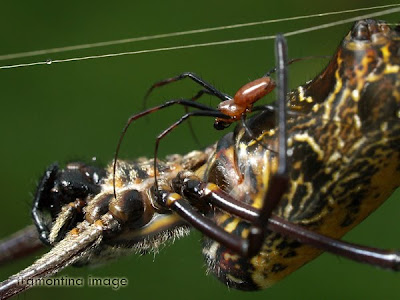ScienceDaily (Apr. 24, 2012) Discerning males remain faithful...if you are a spider. Sex for male orb web spiders (Argiope bruennichi) is a two shot affair since the act of mating destroys their genitalia. If they survive being eaten during their first encounter with a female, they have two choices -- to mate again with the same female (monogynous) or try to find a new partner (bigynous). New research published in BioMed Central's open access journal Frontiers in Zoology shows that choice of mating behavior for A. bruennichi depends on the size and age of the first female they mate with.
Monogamous behavior, such as mating for life, is thought to evolve when paternal protection of the female increases fertilization success. For cannibalistic spiders, monogamy means that the life of the male can be very short indeed. However this can improve chances of fatherhood: males of the black widow spider can increase the duration of mating, and hence the likelihood of successful fertilization, by allowing themselves to be eaten.
Monogamous spiders like A. bruennichi have evolved specialized pedipalps, which are used to transfer sperm into a female's reproductive organs. These specialized genitalia are usually damaged during mating, breaking off inside the female, and forming a plug to prevent subsequent fertilization by a different male. Each male can consequently only mate twice in their entire lives, but, if they survive the first encounter (a female will usually eat the male if mating continues too long) they can then chose to either mate with her again or to find a different female to mate with.
Researchers from the Zoological Institute, University of Hamburg, discovered that the mating strategy of A. bruennichi was not random. Males made mating decisions based on females mating status (virgin or already mated) age, weight, availability of other females, and the time of day.
Klaas Welke explained, "Amongst spiders, regardless of age, heavier females are the most fertile. Males were more likely to mate twice with the same female if it was early in the day, she was heavy, and if the nearest other females were sub-adult. Males kept on searching for a second female if it was late in the day and the first female was light. We found that bigynous males preferred to 'trade up' to heavier females as second mates, but ran the risk of attempting to copulate with already mated females."
Two thirds of the monogamous males were eaten after their first mating. These males, which only managed to mate once, tended to mate with the oldest and heaviest females.
Klaas Welke explained, "These females are the ones which have the highest fecundity and which are most ready to lay their eggs. While these males do not have a second chance at mating their probability of reproductive success is high."
Based on paternity of lifetime reproductive success bigyny appeared to be the more successful strategy. Despite this about half of the males were monogamous and half bigynous demonstrating that males alter their behavior to make the best of the situation they find themselves in.
Story Here

